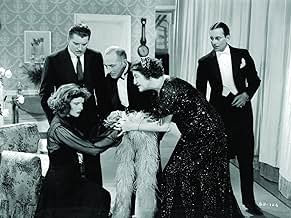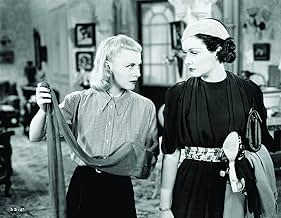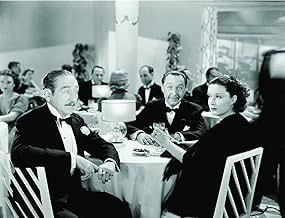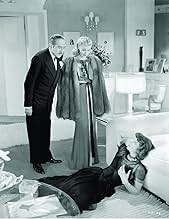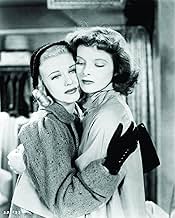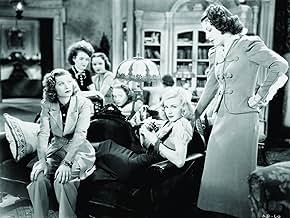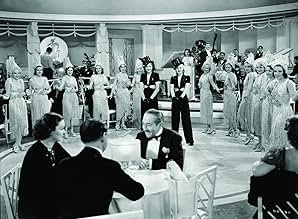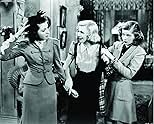CALIFICACIÓN DE IMDb
7.7/10
9.6 k
TU CALIFICACIÓN
Una crónica de las ambiciones, los sueños y las decepciones de las aspirantes a actrices que viven todas en la misma pensión.Una crónica de las ambiciones, los sueños y las decepciones de las aspirantes a actrices que viven todas en la misma pensión.Una crónica de las ambiciones, los sueños y las decepciones de las aspirantes a actrices que viven todas en la misma pensión.
- Dirección
- Guionistas
- Elenco
- Nominado a 4 premios Óscar
- 5 premios ganados y 5 nominaciones en total
Opiniones destacadas
New York City. The Footlights Club is a theatrical boarding house where young women wait for the chance to make it big on Broadway. To deal with the disappointment & bitterness that can set in, they engage in wisecracks & gossip. Fiercely loyal to their friends, they can be wickedly spiteful to those that cross them. Always before them is their dream - to capture elusive success at the STAGE DOOR.
A wonderful film, fresh & sparkling, with great dialogue infusing its wit & drama. The rapid-fire cross talk is still a real treat for viewers - as is the chance to see several fine young actresses early in their careers.
The entire cast is excellent. Brash Katharine Hepburn is the new girl who quickly meets the `regulars': feisty Ginger Rogers, cynical Lucille Ball, wisecracker Eve Arden, lively Ann Miller, snobbish Gail Patrick & sweet Andrea Leeds. While the young ladies certainly get most of the attention, be sure not to overlook Constance Collier, terrific as Miss Luther the has-been actress. Growing old on bittersweet memories, she is a constant reminder to the others what, even with success, they still might become.
Adolphe Menjou gives his usual vivid performance as an immoral producer, while Samuel S. Hinds is good as Hepburn's father. Film mavens will enjoy spotting several familiar faces in uncredited roles: Jack Carson as a Seattle lumberman; Grady Sutton as a butcher's helper; Frank Reicher as a stage director; Franklin Pangborn, hilarious as a butler; and Ralph Forbes in the role of Hepburn's stage spouse.
A wonderful film, fresh & sparkling, with great dialogue infusing its wit & drama. The rapid-fire cross talk is still a real treat for viewers - as is the chance to see several fine young actresses early in their careers.
The entire cast is excellent. Brash Katharine Hepburn is the new girl who quickly meets the `regulars': feisty Ginger Rogers, cynical Lucille Ball, wisecracker Eve Arden, lively Ann Miller, snobbish Gail Patrick & sweet Andrea Leeds. While the young ladies certainly get most of the attention, be sure not to overlook Constance Collier, terrific as Miss Luther the has-been actress. Growing old on bittersweet memories, she is a constant reminder to the others what, even with success, they still might become.
Adolphe Menjou gives his usual vivid performance as an immoral producer, while Samuel S. Hinds is good as Hepburn's father. Film mavens will enjoy spotting several familiar faces in uncredited roles: Jack Carson as a Seattle lumberman; Grady Sutton as a butcher's helper; Frank Reicher as a stage director; Franklin Pangborn, hilarious as a butler; and Ralph Forbes in the role of Hepburn's stage spouse.
10zetes
I don't quite know how to put my passion for this film into words. It's something I never expected. I taped it off of television because I've been on a Ginger Rogers kick lately (I think I'm in love with her), and very luckily experienced something of enormous quality.
There is not a regular plot. Unlike most classical cinema, the goal towards which the film is striving is quite tenuous. Basically, the goal is for Katherine Hepburn to get a part in a play and give a good performance, but it is never stressed. Instead, what we get is more of an ensemble piece. There are characters who are more central than others, but we get to know well a great number of characters. And we live with them, experience their dreams, hardships, and successes, falling more and more deeply in love with them every minute, caring about them as we would dear friends or siblings.
It is most often referred to as a comedy, and the dialogue tends to be hilarious (Ginger Rogers is in full form here, wisecracking at the speed of light), but the film's drama is very affecting, too. This film's ending is so beautiful, and like all great films, we're reluctant to say goodbye to the characters. Fortunately, since I have it on tape, I can visit the boarding house any time I want. Unfortunately, since this film is neither on VHS nor DVD, you probably cannot. Watch for it on AMC or TCM or other stations that play classic films. You will not be disappointed. 10/10
There is not a regular plot. Unlike most classical cinema, the goal towards which the film is striving is quite tenuous. Basically, the goal is for Katherine Hepburn to get a part in a play and give a good performance, but it is never stressed. Instead, what we get is more of an ensemble piece. There are characters who are more central than others, but we get to know well a great number of characters. And we live with them, experience their dreams, hardships, and successes, falling more and more deeply in love with them every minute, caring about them as we would dear friends or siblings.
It is most often referred to as a comedy, and the dialogue tends to be hilarious (Ginger Rogers is in full form here, wisecracking at the speed of light), but the film's drama is very affecting, too. This film's ending is so beautiful, and like all great films, we're reluctant to say goodbye to the characters. Fortunately, since I have it on tape, I can visit the boarding house any time I want. Unfortunately, since this film is neither on VHS nor DVD, you probably cannot. Watch for it on AMC or TCM or other stations that play classic films. You will not be disappointed. 10/10
Katharine Hepburn takes up residence in a theatrical rooming house in "Stage Door," one of the great examples of ensemble acting in film.
Besides Hepburn, the film features Adolph Menjou, Lucille Ball, Ann Miller, Ginger Rogers, Andrea Leeds, Eve Arden, Constance Collier, and Gail Patrick.
Hepburn is a the daughter of a wealthy man who comes to New York to try her hand at acting. She talks a good game, but as we soon learn, she has no emotional understanding or connection to acting at all, approaching everything intellectually.
All of the women are pursuing careers in theater, some with more success than others, and Patrick has a sugar daddy (Menjou). Leeds is the tragic character, a star from the previous season who can't find work but is desperate for the lead in "Enchanted April."
The atmosphere created by director Gregory Lacava perfectly evokes the lively atmosphere of young women living together, sitting in the parlor complaining about food, men, and work or lack of it, as they sing, joke, play piano, strum the ukulele, and talk on the phone - all at once.
The acting is uniformly excellent, with each actress creating a unique character. Lucille Ball gives evidence of the comic timing that would make her one of the greatest TV stars of all time, and there are plenty of ironic one-liners to be had from Eve Arden, and Ginger Rogers matches her in sarcasm.
Ann Miller was supposedly 14 when she made this film; it doesn't seem possible but that was her story and she stuck to it. We do get to see a little bit of her tapping.
Andrea Leeds, bearing such a strong resemblance to Olivia DeHavilland, gives a touching performance as the doomed Kay, who does not have the emotional stability to withstand what can be a devastating career.
It's an extremely melodramatic role and rather than have her play against this, LaCava had her play to it, thus dating what could have stood as a compelling performance even today.
The climactic scenes toward the end are pure '30s, stripping the film of previous lightness and going into tragedy but are effective and real tear-jerkers. By the film's end, though, we've come full circle.
The film is based on the play of the same name which is actually quite different. The whole idea was probably based on the Studio Club in New York City. "Stage Door" is wonderful and the script, acting and direction make it a deeply satisfying experience.
Besides Hepburn, the film features Adolph Menjou, Lucille Ball, Ann Miller, Ginger Rogers, Andrea Leeds, Eve Arden, Constance Collier, and Gail Patrick.
Hepburn is a the daughter of a wealthy man who comes to New York to try her hand at acting. She talks a good game, but as we soon learn, she has no emotional understanding or connection to acting at all, approaching everything intellectually.
All of the women are pursuing careers in theater, some with more success than others, and Patrick has a sugar daddy (Menjou). Leeds is the tragic character, a star from the previous season who can't find work but is desperate for the lead in "Enchanted April."
The atmosphere created by director Gregory Lacava perfectly evokes the lively atmosphere of young women living together, sitting in the parlor complaining about food, men, and work or lack of it, as they sing, joke, play piano, strum the ukulele, and talk on the phone - all at once.
The acting is uniformly excellent, with each actress creating a unique character. Lucille Ball gives evidence of the comic timing that would make her one of the greatest TV stars of all time, and there are plenty of ironic one-liners to be had from Eve Arden, and Ginger Rogers matches her in sarcasm.
Ann Miller was supposedly 14 when she made this film; it doesn't seem possible but that was her story and she stuck to it. We do get to see a little bit of her tapping.
Andrea Leeds, bearing such a strong resemblance to Olivia DeHavilland, gives a touching performance as the doomed Kay, who does not have the emotional stability to withstand what can be a devastating career.
It's an extremely melodramatic role and rather than have her play against this, LaCava had her play to it, thus dating what could have stood as a compelling performance even today.
The climactic scenes toward the end are pure '30s, stripping the film of previous lightness and going into tragedy but are effective and real tear-jerkers. By the film's end, though, we've come full circle.
The film is based on the play of the same name which is actually quite different. The whole idea was probably based on the Studio Club in New York City. "Stage Door" is wonderful and the script, acting and direction make it a deeply satisfying experience.
In fact this film version of a stage play by Edna Ferber and George S Kaufman, directed by Gregory La Cava is 70 years old and although it may show a wrinkle here or there - like having Adolph Menjou as the romantic lead - the youthful energy in the acting and dialog has surfed the waves of time unscathed. The bunch of girls populating the Footlights lodgings is a smashing crowd. Katharine Hepburn, brisk and Hepburnish already to the hilt. Ginger Rogers drinks, scratches and dances a duet with Ann Miller. Eve Arden, as usual, delivers the best one liners and Lucille Ball seems ready for a startling career. Andrea Leeds got an Oscar nomination and Constance Collier plays an over the hill actress that becomes Hepburn's minder, just like in real life. The film moves at an incredible speed and I defy you not to tear up when Hepburn makes her entrance with the Calla Lillies in bloom.
Thanks to the BBC this finally appears as a long-overdue TV showing in tribute to Kate Hepburn. A stunning cast includes Ginger Rogers, Eve Arden, Lucille Ball and Ann Miller (both looking impossibly young!), Constance Collier (one of the great old troupers), Andrea Leeds, Adolphe Menjou, and in the cast but not credited an hilarious performance from Franklin Pangborn as Menjou's butler, plus appearances from Jack Carson, Grady Sutton, Ralph Forbes. It is a classic film fan's joy even if the plot does creak along on a variation of the 'heiress who wants to act' theme.
Hepburn looks fabulous and that brittle voice was rarely used better than to deliver the sparkling script required. Great role for Ginger too (time off from dancing with Fred, this being around the middle of their legendary partnership). Love it. One to treasure.
Hepburn looks fabulous and that brittle voice was rarely used better than to deliver the sparkling script required. Great role for Ginger too (time off from dancing with Fred, this being around the middle of their legendary partnership). Love it. One to treasure.
¿Sabías que…?
- TriviaWhen Katharine Hepburn delivered her climactic stage speech, Gregory La Cava reduced it to only ten lines and filmed it on a closed set. He later brought in the actors and the extras in the audience and had them react to the filmed speech. Many of them broke down.
- ErroresThe band at Club Grotto, where Jean and Annie perform a dance number, includes a female vocalist who can be seen singing in the background, but no vocals are heard on the soundtrack.
- Citas
Terry Randall: [delivering her opening speech in the play within the movie] The calla lilies are in bloom again. Such a strange flower, suitable to any occasion. I carried them on my wedding day and now I place them here in memory of something that has died.
- Versiones alternativasSPOILER: A shot of a man mowing the grass around Kay's grave is missing from some versions.
- ConexionesEdited into Starring Katharine Hepburn (1981)
- Bandas sonorasPut Your Heart Into Your Feet and Dance
(uncredited)
Written by Hal Borne and Mort Greene
Danced by Ginger Rogers and Ann Miller
Selecciones populares
Inicia sesión para calificar y agrega a la lista de videos para obtener recomendaciones personalizadas
- How long is Stage Door?Con tecnología de Alexa
Detalles
- Fecha de lanzamiento
- País de origen
- Idioma
- También se conoce como
- Stage Door
- Locaciones de filmación
- Productora
- Ver más créditos de la compañía en IMDbPro
Taquilla
- Presupuesto
- USD 952,000 (estimado)
- Total a nivel mundial
- USD 8,835
- Tiempo de ejecución
- 1h 32min(92 min)
- Color
- Relación de aspecto
- 1.37 : 1
Contribuir a esta página
Sugiere una edición o agrega el contenido que falta


